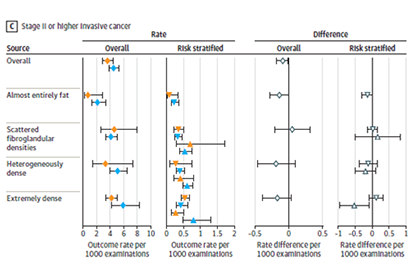In a Journal of American Medical Association study, researchers - including UVM Professor and UVM Cancer Center member Brian Sprague, Ph.D. - found that 3D screening with digital breast tomosynthesis had certain benefits compared to breast cancer screening with conventional 2D digital mammography.

(Graphic courtesy of Brian Sprague)
When 3D mammography or digital breast tomosythesis (DBT) was developed and approved by the FDA in 2011, the hope was it would improve detection of breast cancer in women with dense breasts and decrease anxiety-inducing false-positive results.
In a study of 504,427 women undergoing more than 1.3 screening mammograms – the first study of this size and scope - UVM Cancer Center member and Larner College of Medicine associate professor Brian Sprague, PhD teamed up with four other mammography registries across the country in the Breast Cancer Surveillance Consortium to see if 3D screening made a difference.
As published in the Journal of American Medical Association, researchers found that 3D screening with digital breast tomosynthesis had certain benefits compared to breast cancer screening with conventional 2D digital mammography. For one, the false-positive rate was lower for digital breast tomosynthesis than for conventional 2D digital mammography. And, among women with dense breasts and at high risk of breast cancer, the rate of late-stage breast cancer was reduced among those undergoing digital breast tomosynthesis compared to those undergoing 2D digital mammography.
The first of its size, the study shows that 3D screening can reduce the false positive rate for all women and provide a reduction in late-stage breast cancer for the small group of women with dense breasts and high breast cancer risk. The findings suggest that women with dense breasts and high breast cancer risk should be offered 3D screening to reduce their risk of a late-stage diagnosis, and all women and healthcare providers should be aware of the benefit of reduced false positive rates with 3D screening.
The group's ongoing research will assess the long term benefits of 3D screening compared to 2D mammography after multiple rounds of screening for individual women.
Related:
Breast density, what you need to know
Breast cancer: what we know today